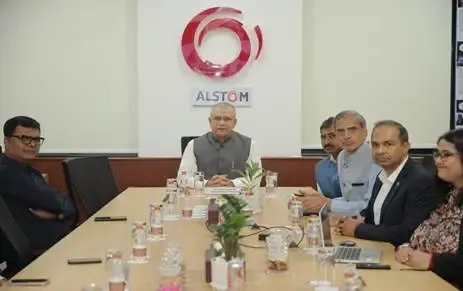Is India Becoming a Leading Exporter of Railway Bogies, Coaches & Locomotives?

Synopsis
Key Takeaways
- Indian Railways is becoming a major global exporter of railway components.
- Significant job creation and international expertise are outcomes of this initiative.
- Alstom’s Savli facility plays a crucial role in manufacturing and exporting railway products.
- India is utilizing advanced technologies like AI for railway maintenance.
- The country is actively involved in international signalling projects.
Vadodara (Gujarat), July 27 (NationPress) - Railways Minister Ashwini Vaishnaw announced on Sunday that Indian Railways is swiftly establishing itself as a prominent exporter of bogies, coaches, locomotives, and propulsion systems as part of the "Make in India, Make for the World" vision.
The minister toured Alstom's Savli facility in Vadodara, a crucial manufacturing center for railway rolling stock in India.
He emphasized that India-produced metro coaches have been sent to Australia and Canada, while bogies have reached the UK, Saudi Arabia, France, and Australia. Propulsion systems made in India have been exported to France, Mexico, Romania, Spain, Germany, and Italy.
Moreover, passenger coaches and locomotives manufactured in India have been dispatched to nations such as Mozambique, Bangladesh, and Sri Lanka.
Vaishnaw noted that the exporting of railway components to various countries is generating substantial employment opportunities in India. He further mentioned that Indian engineers and workers are now acquiring proficiency in international standards, which he regards as a significant achievement of the Make in India initiative.
He praised Alstom’s approach to crafting customized solutions for each order—an innovation that Indian Railways could adopt—and proposed the establishment of a collaborative training program with Gati Shakti Vishwavidyalaya.
The minister also recommended that General Managers of all Production Units engage in training and exposure visits to Alstom’s Savli facility. Discussions also included employing sensors and artificial intelligence for preventive maintenance.
The Savli facility is producing advanced commuter and transit train cars, showing strong commitment to the government’s Make in India and Aatmanirbhar Bharat initiatives. With a focus on innovation and manufacturing excellence, over 3,400 engineers from India are collaborating with 21 Alstom sites globally. Since 2016, India has successfully exported 1,002 rail cars for various international projects, reinforcing its position as a reliable supplier of modern rail systems. Approximately 450 rail cars were produced at Savli and exported to Australia for the Queensland Metro project.
The Savli unit has also exported over 3,800 bogies to countries like Germany, Egypt, Sweden, Australia, and Brazil, along with more than 4,000 flatpacks supplied to Austria. The Maneja unit has significantly contributed by exporting over 5,000 propulsion systems to various global projects.
India is currently leading 27 international signalling projects and providing support for an additional 40 projects worldwide. Bengaluru's Digital Experience Centre is fostering innovation through support for over 120 projects globally, focusing on next-generation signalling using IoT, AI, blockchain, and cybersecurity.
A robust network of leading suppliers backs the manufacturing ecosystem near Savli, including notable companies like Integra, Anovi, Hind Rectifier, Hitachi Energy, and ABB, specializing in fabrication, interiors, and electrical systems.
Speaking to the media, the Union Minister remarked that the effects of the "Make in India and Make for the World" initiatives are clearly evident in the Indian Railways manufacturing sector. He underscored that the export of railway components to numerous countries is generating significant employment opportunities in India. The Minister reiterated that Indian engineers and workers are gaining expertise in international standards, marking a notable success of the Make in India mission.










